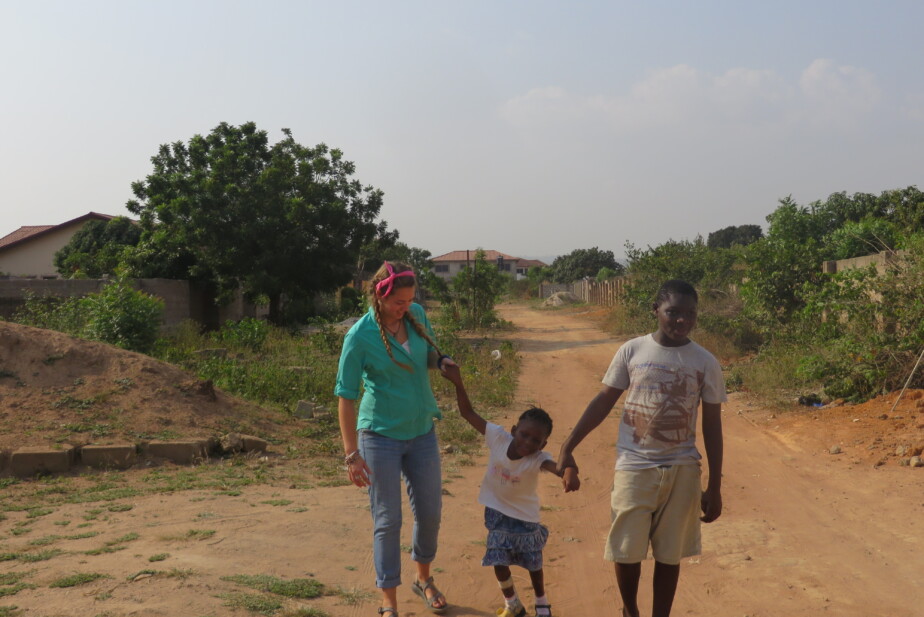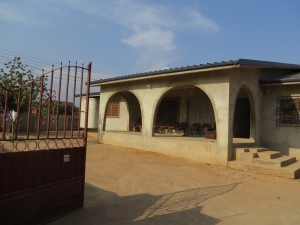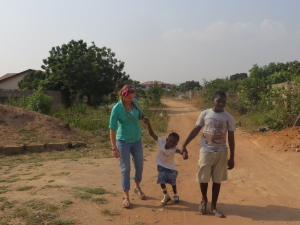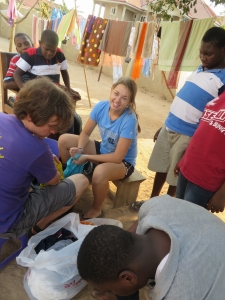
Anna Brodmerkel
I have now lived in Ghana for almost two weeks now and am able to give you a better idea of what life is like here for me. Although Ghana is similar in ways to home, it differs greatly and can overwhelm and confuse me at times. I will attempt to explain the situation as best as I can, but I cannot imagine you would completely understand unless you could see it for yourself.
YAP (Youth Advocacy Programs) Ghana: I volunteer with the NGO YAP Ghana. A grassroots organization, YAP Ghana was founded in 2009 as an alternative schoolingsystem for children with learning disabilities. Other schools for children with special needs have been described as “institutional” in Ghana, and YAP Ghana uses a community care approach instead. It is a small program, and the six staff members, volunteers, and most students live at the school. The school currently has fifteen students enrolled.
Classes: Lessons began Monday, January 20th. (My first week here was mostly babysitting.) We begin with a good morning song, Ghana’s national song and pledge, and the Lord’s Prayer. The children then practice marching some mornings because YAP Ghana was invited to march in Ghana’s Independence Parade on March 6th with all the other schools. After marching and a water break the students come back in to practice learning the alphabet, numbers, shapes, colors, and nursery rhymes. After the morning lesson we take break for a rest, eat lunch, then go outside for an afternoon activity The classes feel very disorganized at the moment but we are working to create a schedule and plan that works.
The Students: Kids are kids whether they have disabilities are not; there’s not a difference in personality types at all. Most of the children here can’t talk well, but can communicate their needs. The children learn life skills at YAP Ghana such as using the toilet, bathing, and cleaning for themselves, and some are more advanced than others. These children need constant care, which can be tiring and frustrating at times, but also rewarding.
Safety and Sanitation: Ghana is extremely safe, and the only real worry is sanitation, or rather lack of. Trash mounds littler the street, and toilet paper is a BYOTP (Bring Your Own TP) affair. It’s clear the health standards are significantly lower here, but it’s manageable.
Water: Instead of drinking from plastic bottles, we drink filtered water from plastic bags. You rip a corner of the bag with your teeth and then proceed to drink. The bag takes less plastic than a bottle and doesn’t take long to get used to.
Accommodation: All the volunteers, staff, and students live at the school. The building is comprised of seven buildings, six bathrooms, one large living/dining room, and a kitchen outside. I share a room with another female volunteer, Inbar, and we each have a twin bed and table to put our belongings on. Mosquitos are not a real concern here, and we do not need mosquito nets, but our standing fan is essential even with the slight breeze coming through the window (which has metal bars on the outside of it).
Bathroom/Shower: The volunteers use the main tolite ad shower that are located in two separate , side by side rooms. Both of these rooms have a real sink, and I’m almost certain that the bathrooms with sinks do not work. Let’s just say I use my hand sanitizer religiously here… Sometimes the shower doesn’t work and we use buckets to shower, which I don’t mind too terribly because it conserves water. I also use the shower to brush my teeth, but I make sure to use the bagged water because the shower water could make me sick.
Laundry: Everyone here must hand wash laundry with washing powder and a soap bar made for clothes. The process: fill two large buckets with water, add washing powder to one, let clothes sit for a few minutes, use the soap bar on the clothes, scrub, scrub, scrub! If your knuckles don’t hurt by the end of the load, you aren’t doing it right. Then I wring out most of the soap, transfer the washed clothes to the second bucket, let the clothes soak, wring out the water, and hang them o the clothesline strung between two trees to dry.
Food: Where to begin? For breakfast we eat a porridge that reminds me of baby food, but tastes fine. Most dishes are composed from wither maize, cassava, yam, or rice and a spicy pepper sauce served with fish, goat, or chicken. I’ve never handled eating spicy food well, but by the time I leave I will be able to eat hot foods like a pro! The food varies greatly from what I am used to and is usually mostly starch. I miss my fresh, crunchy, green foods, but have learned to love bananas as a replacement. I never liked bananas before, but here they are cheap and a good supplement to the meals I never seem to be able to finish. People here eat extremely large portions, and I usually end up giving half my bowl to the kids. May not particularly enjoy every meal, but I am learning to adjust. I also have a large jar of peanut butter in case I feel hungry. It took my stomach a few days to adjust to the new food and environment, but I am fine now. I did say I wanted a change!
Language: People may speak English, but Twi is the most common language. People know Twi even if their village speaks another language. I am trying to learn Twi and already know basic greeting and numbers 1-100.
A Snapshot:
Students:
Phillip- age 9, loud, bossy, troublemaker, jokester, musically inclined
Larwah- age 10, dramatic, troublemaker, likes to steal others’ food, athletic
Dela- age 18, quiet, introverted, a TV lover, loves to hold hands
Mimo- age 21, music lover, singer, energetic
Kuku- age 13, music lover, gentle, quiet, always smiling, good listener
Adwoa- age 13, dancer, sweet, always smiling, good listener
Appiah- age 14, stubborn, curious, friendly
Shalom- age 6, quiet, curious, sweet, energetic, a little monkey
Dorothea- age 9, loud, dramatic, sweet, happy, headstrong
Akua- age 13, dancer, good life skills, quiet
Zadok- age 10, drummer, helpful, loud, energetic
Joanna- age 16, mischievous, dancer, sometimes violent, always laughing
Yaw-age 14, singer, dancer, athletic, sweet, intelligent
Elorm- age 21, sweet, helpful, intelligent, athletic
Kwame- age 11, sweet, athletic, friendly, a ladies man
Staff:
Lawson- Head of YAP Ghana, Lawson is always very busy handling business, as he will return to his home and other job in London soon. He is kind and soft spoken with big dreams for YAP Ghana.
Ema- Teacher and Caretaker; he has a huge heart and tries his best to help the children in every way possible. All the students respect Ema very much.
Theresa- Teacher, Caretaker, Cook; always smiling, Theresa radiates happiness. She has dreams of joining the military and is one tough cookie!
Auntie Yeii- Caretaker, Cook; she cannot be compared with anyone I know. She keeps everyone in line, in fact, she could keep anyone in line. She has a strong bond with all the children and is constantly making me laugh.
Becky- Caretaker, Cook; she is an absolute sweetheart. Her singing can always be heard from the kitchen brightening the day.
Sarfoa- Caretaker, Cook; Sarfoa (pronounced Sah-faw) completes every task with a quiet finesse, and is just an awesome person to be around. When she’s not cooking or washing clothes, the children cling onto her play fighting or laying on top of her.
Volunteers:
John Mark- age 29 (looks 25), from Alabama, lived and taught English in Japan for the past five years. John Mark and I always joke about the differences between the western world and Ghana. Our conversations range from taking ice cream baths to our bathroom results. Throughout this whole process I’ve enjoyed having John Mark to talk to because we can relate easily as we are both travelers and from small, southern towns. Outgoing and energetic, John Mark can truly bring out the best in the children. It is clear he has taught before because he has countless ideas for classes here. He calls himself “a lover,” and generously allows me to use his laptop as mine is poop when it can’t directly connect to wifi (long story short, don’t buy a google chromebook). Once returning home, John Mark will begin graduate school to study clinical social work and possibly obtain a dual degree in special education.
Inbar- age 26, from Israel, lived in the US for her adolescence, returned to Israel t 23. Inbar has such a passion for life and is fearless. She can usually be found trying to learn more about the culture and Ewe language. A natural musician, Inbar can play many instruments including the ukulele, which she brought with her (lucky for me!) She gives me lessons and taught me two songs and all the minor and major chords thus far. She also drums and studied Ewe drumming which originates from the Volta Region of Ghana. She will study more of this while she is here.



